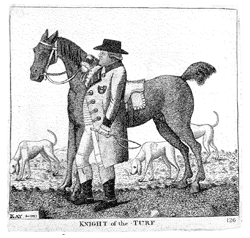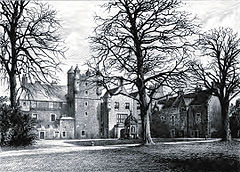Sir Archibald Hope, 9th Baronet
Sir Archibald Hope, 9th Baronet Hope of Craighall (1735 – 30 July 1794) was a Scottish aristocrat.

Life

.jpg)
Sir Archibald Hope was born in 1735, the only surviving son[1] of Archibald Hope and Catherine Todd, eldest daughter of Hugh Todd.[2][3][4] Sir Archibald's father was the oldest son of Sir Thomas Hope, 8th Baronet. Sir Thomas was an early promoter of agriculture in Scotland. One of his more ambitious projects was the draining and cultivating of a marshy piece of land south of Edinburgh.[5] Today that area is known as The Meadows, but historically was often referred to as Hope Park.[5] When his father died young, Sir Archibald became the heir to the baronetcy, which he succeeded to on 17 April 1771, upon the death of his grandfather.[5][2]
The Hope Baronetcy of Craighall in the County of Fife, was created in the Baronetage of Nova Scotia on 19 February 1628 for Thomas Hope, a Scottish lawyer and advisor to Charles I.[3]
In 1778 Sir Archibald purchased Pinkie House in Musselburgh, Edinburgh, Scotland from the Marquess of Tweeddale and established it as the seat of the Hopes of Craighall.[2][5] Like his grandfather father before him, Sir Archibald had a great interest in agriculture, and was devoted to improving his estate, establishing a considerable and profitable salt and coal works on them.[5]
The only public office Sir Archibald held was Secretary to the Board of Police, and upon the abolition of the office, received a life compensation in lieu of the office.[6]
In 1789, caricaturist John Kay entitled his likeness of Sir Archibald, Knight of the Turf, likely as a nod to his presidency of the Caledonian Hunt.[6]
Sir Archibald Hope died at Pinkie House on 10 July 1794.[7] He is buried in the Hope family plot at St. Michael's Churchyard, Inveresk, Scotland.
Family
Sir Archibald married twice, and had large families with both wives. In 1757 he married Elizabeth Macdowell (d. 1778), the daughter of William Macdowell of Castle Semple, Renfrewshire, and had the following children:[2]
- Archibald Hope, (1762 - 1782), died a prisoner of Hyder Ali's at Seringapatam[8][9]
- Sir Thomas Hope, 10th Baronet, (1768-1801), died without issue and was succeeded in the baronetcy by his half-brother, Sir John Hope, 11th Baronet
- Isabella Hope, married Colonel William Cullen of Parkhead, d. 1842; she survived the sinking of the Winteron East Indiaman off the coast of Madagascar, 20 August 1792[10][11]
- Catherine Hope, d. 1826
- Grahame Hope[1], d. 1843[2]
- Elizabeth Hope, d. 1827
In 1779,[12] after his first wife's death, Sir Archibald married Elizabeth Patoun (d. 1818), the daughter of John Patoun of Inveresk, and had the following children:[2]
- Sir John Hope, 11th Baronet, (1781-1853), was succeeded in the baronetcy by his eldest son, Sir Archibald Hope, 12th Baronet
- Hugh Hope (1782-1822), a civil servant for the East India Company, and a portrait of him by Sir Henry Raeburn hangs in The Cleveland Museum of Art[13]
- William Hope, (1784-1837), was a master-attendant at Calcutta
- Magdalen Hope, married John Scott of Gala,[14][15] d. 13 July 1873, her eldest child was Hugh Scott of Gala.
References
- Sir Robert Douglas (1798). The Baronage of Scotland. Edinburgh, Scotland. pp. 58–61. Retrieved 23 July 2017.
- "Peerage and Baronetage". Genealogical and Heraldic Dictionary of the Peerage and Baronetage of the British Empire. Burke's Peerage Limited. 1914. pp. 1034–2035. Retrieved 22 July 2017.
Hope
- "Creations by Charles I; Hope". Complete Baronetage: English, Irish and Scottish, 1625-1649. W. Pollard & Company, Limited. 1902. pp. 343–345. Retrieved 23 July 2017.
- Church of England, Diocese of Carlisle (2015). "Introduction". The Diocese of Carlisle, 1814-1855: Chancellor Walter Fletcher's 'Diocesan Book', with Additional Material from Bishop Percy's Parish Notebooks. England: Boydell & Brewer Ltd. p. xxv. Retrieved 23 July 2017.
- William Anderson (1867). The Scottish Nation: Or the Surnames, Families, Literature, Honours, and Biographical History of the People of Scotland, Volume 2. Fullarton. p. 491. Retrieved 22 July 2017.
- James Patterson; John Kay (1885). Kay's Edinburgh Portraits: A Series of Anecdotal Biographies Chiefly of Scotchmen, Volume 1. Hamilton, Adams. pp. 214–215. Retrieved 22 July 2017.
Sir Archibald Hope, Baronet, Of Pinkie
- "The Oxford Journal, Oxfordshire, England". England. 19 July 1794.
London, July 18
- E. Stock (1889). "The Scottish Art Review, Volume 2". Google Books. London, England: Walter Scott. pp. 80–84. Retrieved 3 June 2017.
The Mansions of Scotland and Their Contents
- "TIPU - Mysore History". The Tiger Ant The Thistle, TIPU Sultan And The Scots In India. Retrieved 22 July 2017.
'Memoirs Of The Late War In Asia With A Narrative Of The Imprisonment And Sufferings Of Our Officers And Soldiers By An Officer Of Col. Baillie's Detachment' : London 1788
- Charles Rogers (1871). Monuments and monumental inscriptions in Scotland, Volume 3. pp. 22–23. Retrieved 22 July 2017.
- "General Monthly Register of Births, Marriage and Deaths, at Home and Abroad". The Court magazine and belle assemblée [afterw.] and monthly critic and the Lady's magazine and museum, Volume 21. Dobbs and Co. 1842. Retrieved 23 July 2017.
- "A Scottish Cowrie Shell Silver Mounted Box". Koopman Rare Art. Retrieved 23 July 2017.
Silver & cowrie shell Circa, 1779 Length: 7.5cm, 2.9in Bearing the arms of Sir Archibald Hope (1735 -1794), The arms on the shell box are for Sir Archibald Hope (1735 -1794), the 9th Baronet of Craighall in the County of Fife (and later of Pinkie, near Musselburgh in the County of Edinburgh) and his second wife, Elizabeth Patoun (died 5th January 1818), daughter of John Patoun of Inveresk in the County of Edinburgh. Sir Archibald and Elizabeth were married in the year 1779.
- Sir Henry Raeburn (Scottish, 1756-1823). "Portrait of Hugh Hope, c. 1810". The Cleveland Museum of Art. Cleveland, Ohio, USA. Retrieved 3 June 2017.
Acquired 1991
- Sir Bernard Burke (1863). "Scott of Gala". A Genealogical and Heraldic Dictionary of the Landed Gentry of Great Britain and Ireland, Volume 2. Harrison. p. 1341. Retrieved 23 July 2017.
- Robert Hall (1898). "1820". The history of Galashiels. Published under the auspices of the Galashiels Manufacturer's Corporation [by] A. Walker, 1898. p. 95. Retrieved 23 July 2017.
magdalen hope john scott of gala.
External links
| Baronetage of Nova Scotia | ||
|---|---|---|
| Preceded by Thomas Hope |
Baronet (of Craighall) 1771–1794 |
Succeeded by Thomas Hope |